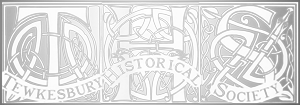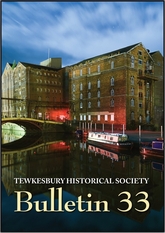History Topics About Tewkesbury
Women's Suffrage partial franchise anniversary
A century ago on this day the Representation of the People Act passed into law. In the following December, women were allowed to vote in Parliamentary Elections. BUT not all women – only those over 30 and who possessed certain property ...

Civic Heraldry of Tewkesbury
Tewkesbury was granted a Charter by Elizabeth I in 1574, which created the Common Council to govern the town, which comprised two Bailiffs and twelve principal burgesses. This Common Council continued until it was swept away by the Municipal Corporations ...

Tewkesbury's Early Freemen
In modern times, the award of the freedom of a borough, town or city is a symbolic honour, bestowed by the donor on its recipient as a mark of esteem and respect, usually celebrating some service which the new freeman has given to the donor authority or ...
Lighten Our Darkness
The period 1830-1860 was one of the most politically and socially agitated of the century. In 1832, many believed that England had come as close to revolution as at any time in her history. As the reform bill of 1832, the Chartist riots and the agitation ...
River Trade On The Severn 1565-1765
The Severn is the longest naturally navigable river in England; it was always navigable from Shrewsbury to the estuary, and during the seventeenth century it was made navigable as far as Pool Quay, near Welshpool. The River Avon was made navigable in the 1...

The Tewkesbury Barons
With the death of Henry, Lord Capel , in 1696 the Barony of Tewkesbury, created for him in 1692, became extinct. It remained so, however, for only ten years, being resurrected by Queen Anne in 1706. Today the title is one of those held by the ...
Cholera in 19th Century Tewkesbury
The arrival of cholera in England for the first time in October 1831 could hardly have come at a less propitious time. The rapid growth of the new industrial towns and cities, with their haphazard arrangements for water supply and sewage disposal, had ...

The Lords of Tewkesbury
Earl Bertric’s rejection of Matilda, who was later to become the wife of William the Conqueror, resulted in his being the last (Saxon) Lord of Tewkesbury. After William died in 1087, his son, William Rufus, granted the Lordship to Robert Fitzhamon , ...

As Poor as a Church Mouse
Tewkesbury is fortunate that many of its probate inventories survive from the early modern period. These legal documents were drawn up to assist the transmission of property after the death of the testator, they were usually drawn up to itemize ...
The state of the Corporation 1833
In 1835, the Gloucestershire Chronicle published a report on the Borough, explaining the way the Corporation worked and reviewing the state of the local economy. It is surprising how much which is now done at County or even national level was once ...
In The Name of God, Amen
Almost all wills of the period commence with the declaration which forms the title to these notes, suggesting immediately the authority which the Church exercised in matters of probate. Following, almost invariably, are the testator’s hopes for the future ...

Tewkesbury’s Stockingers, Part II
It is now 1860 and the old stockinger, now in his eighties and still trying to earn a crust at the hand knitting machine, walks back from the Baptist Chapel in Church Street to his cottage in one of the alleys in the High Street. He ...

Tewkesbury’s Stockingers, Part I
Stocking[1] Frame Knitting was a major industry in the 18th-19th centuries in Tewkesbury. The inventor of the machine was a clergyman, Rev. William Lee , and it remained the same design from the late 16...

Glimpses of the Railways at Tewkesbury and Ashchurch, 1913-45
Laurence Aldridge , father of Mrs. Irene Andrews ,[1] was Station Master at Tewkesbury Railway station from 1911. The family lived at Station House. Like the station itself, the house has now been pulled down, but both are remembered ...

Chartism in Tewkesbury and District
And weary Parliament with ceaseless cries”
Ernest Charles Jones (1819-1869) Chartist and poet. Two lines from a long poem The New World
...
Tewkesbury's Name
The name Theoc has been appropriated in different ways in Tewkesbury. As usual popular usage may mask the reality (Editor) The origin of Tewkesbury’s place name has been the subject of much discussion and much confusion. This is largely ...
A Serving of Metropolitan Culture in Eighteenth-Century Tewkesbury
Eating at a Country Inn by J Green Illustrations of the interiors of inns during the early modern period are rare. However, J. Green’s print, Eating at a Country Inn21 from the early nineteenth century, contains many elements that ...

Changing Rooms & Fashions
This year I was fortunate enough to be shown some of the surviving painted murals in The Royal Hop Pole Inn in Church Street, which comprises three historic buildings dating from 1500-1800.[1] Preliminary research suggests the paintings may ...

‘A Stitch in Time’
Tewkesbury was typical of many market towns with many craftsmen running small businesses and some larger merchants.[1] However, it did have important staple trades: indeed, much of Tewkesbury’s prosperity during the medieval period was from the ...
An Accident on Holm Hill - Wednesday 14 December 1825
An accident, which had nearly proved of the most serious consequence, happened at Tewkesbury on Wednesday afternoon. As one of the Bath coaches, on its way to Worcester, was descending the hill near the House of industry. the splinter-bar broke, by which the horses (the best and most spirited upon the road) became no longer subject to the guidance and control of the coachman, and a most awful prospect presented itself to the unfortunate passengers. The Hermitage turnpike-gate is situated immediately at the bottom of the bill, and a narrow bridge over the river Swilgate is just beyond ; and, as the horses were Going at full speed, it seemed past the bounds of probability that they would steer clear both of the gate-posts and of the low rails of the bridge; they did, however, luckily avoid both ; but the vehicle came in contact with the railing on the causeway between the bridge and the church, and the coach, the horses—and, of course, the driver and passengers —were hurled together into the field beneath. But we are happy to say that the injury sustained was astonishingly trivial: the coachman and some of the outside passengers, and a lady who was inside, suffered a few bruises, but neither the horses nor coach sustained any material damage—although the meadow into which they rolled is at least six feet below the surface of the road. Had the coach gone over only a few yards nearer the turnpike, the consequences must have been dreadful, as the whole would then have been precipitated to a great depth into the midst of the river, which was at that time very much swollen from the recent rains—Gloucester Journal.Accidents with stage coaches were quite frequent, the most common cause was either misjudgement by coachmen descending hills or a failure of the very rudimentary breaking system, as in this case



